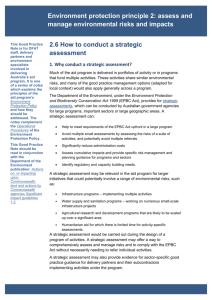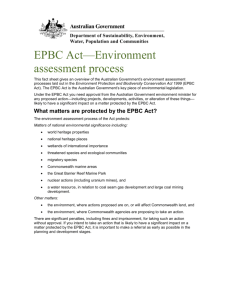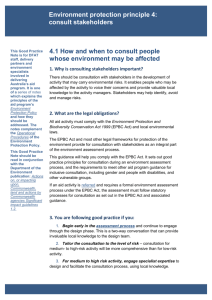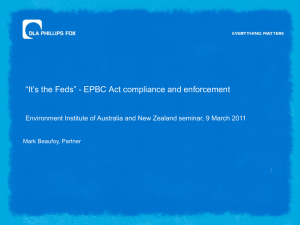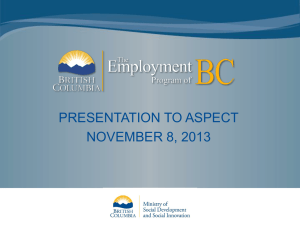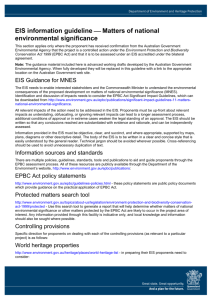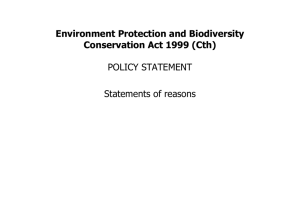Consideration of a person`s environmental history when making
advertisement
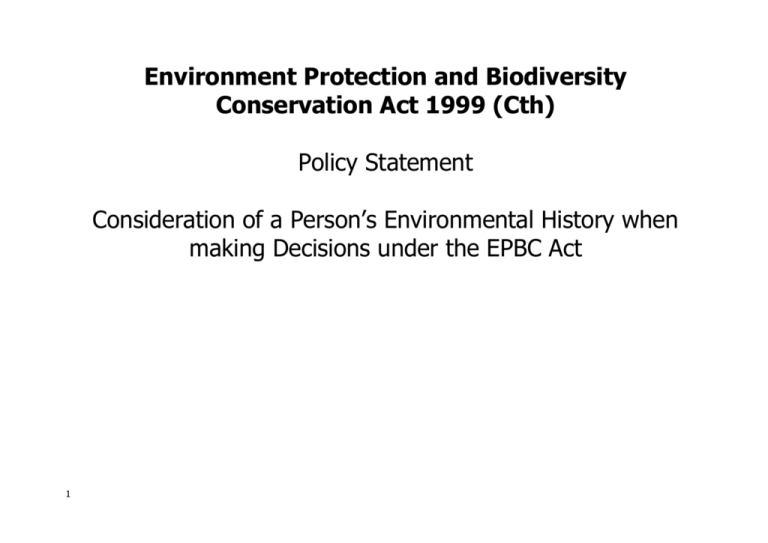
Environment Protection and Biodiversity Conservation Act 1999 (Cth) Policy Statement Consideration of a Person’s Environmental History when making Decisions under the EPBC Act 1 In particular, environmental history is a relevant consideration for decisions under subsections 136(4), 143(3), 144(3), and 145(3) of the EPBC Act. Contents Overview 1 Decisions involving consideration of a person’s environmental history 1 Approval of actions (Chapter 4) 1 Permit applications (Parts 13 and 13A) 1 Bodies corporate, subsidiaries and executive officers 2 Information relevant to a person’s environmental history 2 Non-compliance without a conviction 2 Non-compliance without proceedings being initiated 3 Remediation determinations, enforceable undertakings etc under the EPBC Act 3 Sources of information about a person’s environmental history 4 Natural Justice 4 Overview This Policy Statement relates assessing a person’s ‘environmental history’ for the purposes of making decisions under the Environment Protection and Biodiversity Conservation Act 1999 (EPBC Act) and Environment Protection and Biodiversity Conservation Regulations 2000 (EPBC Regulations). The Policy Statement sets out: the decisions under the EPBC Act which require consideration of a person’s environmental history; the kind of information relevant to a person’s environmental history; sources of information relating to a person’s environmental history; and how to ensure that a person has an opportunity to comment on any information relied on in the decision-making process. Decisions involving consideration of a person’s environmental history Approval of actions (Chapter 4) The Minister responsible for administering the EPBC Act or their delegate (Minister) may have regard to a person’s history in relation to environmental matters (their environmental history) when making certain decisions under the EPBC Act. (For ease of reference, the Minister and Ministerial delegates are subsequently referred to as the Minister.) This consideration of a person’s environmental history applies in particular to decisions concerning: Assessment approach: referral documentation – under subsection 87(4A) of the EPBC Act the Minister may only decide on an assessment on referral information if satisfied that the action meets the prescribed criteria set out in Division 5.1A of the EPBC Regulations, which includes (if the information is available) that the person proposing to take the action has a satisfactory record of responsible environmental management and compliance with environmental laws (regulation 5.03A(1)(e) of the EPBC Regulations); Approval of an action - under subsection 136(4) the Minister may have regard to a person’s environmental history when considering whether to grant an approval to that person for the taking of an action and/or attach conditions to that approval; Variation, suspension or revocation of approval - the Minister may take into account an approval holder’s environmental history when deciding whether to revoke, vary or add to conditions (subsection 143(3)), or suspend or revoke an approval (subsections 144(3) and 145(3)); and Consent to transfer an approval - under subsection 145B(4) the Minister may consider the transferee’s environmental history when deciding whether to consent to the transfer of an approval. Permit applications (Parts 13 and 13A) The Minister may, in deciding whether to grant a permit to a person under Parts 13 or 13A of the EPBC Act, consider whether the person has, in the 10 years before the application, been convicted of an offence mentioned in regulation 17.07(1) of the EPBC Regulations or, is subject to proceedings for such an offence. The Minister could also consider other information about a person’s environmental history if relevant to the grant of the permit. Bodies corporate, subsidiaries and executive officers The EPBC Act does not define ‘body corporate’, but the term ordinarily means any artificial person1 which has a separate legal identity and is identified by a particular name. These entities have perpetual succession2. They have the power to act, hold property, enter into legal contracts, and can sue and be sued in their own name. Bodies corporate include entities created by statute, by registration under statute, and under common law. Bodies corporate can apply for approvals and permits under the EPBC Act. Under sections 136 (4), 143(3), 144(3), 145(3) and 145B(4) of the EPBC Act, if the relevant person (i.e. the proponent of an action, approval Butterworths Concise Australian Legal Dictionary, 2nd edition, 1998 defines an ‘artificial person’ as “an entity recognised by law but which is not a holder or transferee of an approval) is a body corporate, the Minister may also consider the environmental history of the executive officers of the body corporate. An executive officer of a body corporate is defined under section 493 of the EPBC Act as “a person, by whatever name called and whether or not a director of the body, who is concerned in, or takes part in, the management of the body”. Information relevant to a person’s environmental history Whether information regarding a person’s environmental history is relevant will depend on the particular circumstances relating to a decision. Not all information about a person’s environmental performance may necessarily be relevant in the context of the decision at hand. For example, evidence of good environmental performance in a particular area will usually provide a broad indication of a person’s general approach to environmental management. However, this information is only relevant to a specific decision under the EPBC Act insofar as it can be used to usefully predict their future compliance with the requirements of that decision. The provisions of Chapter 4 of the EPBC Act that allow a person’s environmental history to be taken into account are expressed broadly. The provisions do not limit the information relevant to a person’s environmental history to the person’s past environmental criminal convictions or civil penalties awarded against them. Information relevant to the person’s environmental history is that which will indicate whether a person is likely to comply with the conditions of an approval. 1 real person, for example a company.” Ibid, ‘perpetual succession’ is defined as “that characteristic of a company which makes it a continuing entity in law with its own identity regardless of changes in its membership. A registered company is declared to have perpetual succession.” 2 2 with State or Territory environmental legislation; where the person is a body corporate, the person’s environmental policies and corporate plans; details of previous EPBC Act approvals and permits held and the level of compliance with the approval and permit conditions; and details of audits in relation to environmental matters. Such information may include, for example: records of State, Territory or Commonwealth court or tribunal proceedings against the person involving compliance with environmental laws. The general principles regarding evidence of instances of noncompliance with the EPBC Act would also apply to alleged instances of non-compliance In the case of the grant of a permit under Chapter 13 or 13A of the EPBC Act, the above considerations generally apply in relation to the matters mentioned in subregulation 17.07(1) of the EPBC Regulations, as well as any other aspect of an applicant’s environmental history that is relevant to the grant of the permit. Non-compliance without a conviction Evidence of non-compliance, without a conviction, is equally relevant to matters arising under State or Territory environment laws, or other Commonwealth environmental laws. arising under State or Territory environment laws, or other Commonwealth environmental laws. The Minister may consider information indicating incidents of non-compliance by a proponent or an approval holder with provisions of the EPBC Act (or other Commonwealth, State or Territory environmental legislation) as part of a person’s environmental history, including cases where those incidents did not involve the person being convicted of an offence. The absence of sufficient evidence to establish a conviction for an offence does not of itself prevent the Minister from being satisfied that the incident occurred. If evidence of a person’s non-compliance is identified (e.g. through monitoring and audit activities) this evidence may be included in relation to the person’s environmental history, even if no proceedings3 were commenced against the person. In these cases the department’s recommendations to the Minister should state why the department did not take legal action – this may reflect policy reasons such as the availability of alternative administrative mechanisms. The degree of non-compliance involved in these cases would be made clear in the recommendation provided to the Minister or a delegate. However, the evidentiary weight that can be given to information about such non-compliance will depend upon the reason why there was no conviction. In cases where the proponent or approval holder has admitted that the noncompliance occurred, it would generally be reasonable for the Minister to consider that information in relation to the person’s environmental history. In cases where a person was acquitted of a prosecution, or where criminal proceedings were otherwise resolved with no admission of guilt by the person, information relating to the alleged incident should not generally be taken into account as part of a person’s environmental history. Where information about a non-compliance incident is taken into account as part of a person’s environmental history, no implication or suggestion would be drawn that the person would have been convicted or subject to a civil penalty if proceedings had been initiated against that person. An incomplete investigation would not be considered as part of a person’s environmental history, as no proceedings may result or the person may be found not to have contravened any environmental requirements. Non-compliance without proceedings being initiated Evidence of non-compliance, without proceedings being initiated is equally relevant to matters 3 3 Ibid, proceedings is defined as “an action commenced in a court”. Remediation determinations, enforceable undertakings etc under the EPBC Act If the Minister considers that an action taken by a person has contravened a civil penalty provision of Part 3, the Minister may make certain administrative ‘penalty’ decisions, including remediation determinations (section 480D) and accepting an enforceable undertaking (section 486DA). A court determination stating a contravention occurred is not necessary for this decision. Nevertheless, the Minister must consider that a contravention has occurred, and would only make such a decision where strong evidence supports that view. If the Minister makes, for example, a remediation order, and the decision is supported by an admission by the relevant person, the evidence used to support the decision about the contravention would be relevant to the person’s environmental history. However, if the person has not admitted to the contravention, then the department would not usually take the information into account as part of a person’s environmental history. In such cases, a Ministerial remediation determination or enforceable undertaking would not be considered in isolation, but in relation to the evidence about the circumstances of the alleged contravention which led to the Minister issuing the determination or undertaking. Sources of information about a person’s environmental history The EPBC Act does not limit the type of information that could be relevant to a person’s environmental history. Information may be obtained from various sources, including by the department from its own records (e.g. audit reports), directly from the proponent (e.g. admissions to failing to comply with approval conditions), or from other external sources (e.g. court reports and Commonwealth/State/Territory agencies). Section 6 of the Department’s ‘Referral of proposed action’ form requires proponents to set out their environmental history, including whether their record is satisfactory, and whether they have been subject to proceedings under an Australian environmental law. This information is supplemented by the Department’s records of proponent compliance. Other sources of information of a person’s environmental history are Public Environment Reports (PER) or Environmental Impact Statements (EIS) pursuant to paragraphs 97(2)(b) and 102(2)(b). These paragraphs require the proponent to comply with any matters specified in the regulations. EPBC Regulation 5.04 requires the person proposing to take the action to address the matters in Schedule 4 of the EPBC Regulations. Among other things, Schedule 4 requires that the person proposing to take the action provide details of any proceedings under a Commonwealth, State or Territory law for the protection of the environment or the conservation 4 and sustainable use of natural resources against the person proposing to take the action. In the case of corporations, corporations are also required to provide details of their environmental policies and planning framework. to provide comments) depends on the circumstances of the particular case, including: The department will check the accuracy of any information provided by individuals or agencies against publicly available sources (e.g. checking whether particular offence proceedings against a person resulted in an acquittal). (ii) the nature of the interest affected by For example, if searching for case law, a useful starting point is the Australasian Legal Information Institute (www.austlii.edu.au). Alternatively, State and Territory law court sites provide copies of recent cases (e.g. NSW: www.lawlink.nsw.gov.au). (iv) whether it is an area of high-volume Natural Justice If information about the person’s environmental history is before the Minister the person will be given an opportunity to comment on any adverse findings and its relevance to the decision being made before the decision is finalised (known as the natural justice hearing rule or in this note, simply referred to as natural justice). Failure to adhere to the requirements of natural justice can result in the decision being challenged under the Administrative Decisions (Judicial Review) Act 1977 (Cth). (a) The nature of the Department’s natural justice obligations (i.e. the amount and type of information that must be provided to a person and the period they should be given (i) the particular provisions of the EPBC Act; the decision, and the consequences of the decision for the person; (iii) the degree of urgency with which the decision must be made; decision-making; and (v) the existence of merits review or of a staged decision-making process. In the case of information indicating an incident of non-compliance, the person would generally be invited to comment on whether the incident occurred, any mitigating circumstances and any subsequent steps the person has taken to remediate the incident. However, in certain circumstances, the Minister may not be required to comply with the requirements of natural justice or, may do so by doing less than set out in the previous paragraph. Examples of this include: a) a decision under subsection 87(4A) to assess a proposed action on referral information – in this instance the decision-maker is generally not required to provide procedural fairness as an assessment approach decision does not directly affect the interests of the person; and b) a decision under section 133 or 134 – in this instance, section 131AA of the EPBC Act provides an exhaustive statement of the Minister’s natural justice obligations in relation to a decision on whether or not to approve an action under section 133 of the Act, and attach any conditions to the approval under section 134, including the Minister’s consideration of a person’s environmental history as part of this decision. In these circumstances, the Minister may nevertheless decide to afford natural justice, or do more than lawfully required to afford natural justice to a person. For example, if a particular approval condition is proposed because of the information that the Minister has about a person’s environmental history, it may be consistent with the spirit of procedural fairness requirements to give the relevant person a chance to comment on that information even though section 131AA does not expressly require the Minister to do so. Similarly, if unfavorable information about the person’s environmental history is taken into account for the purposes of regulation 5.03A(1)(e), then it would usually be appropriate to provide the person an opportunity to comment on the information, as a right to procedural fairness may be considered to arise because the information could be damaging to the person’s reputation. 5
